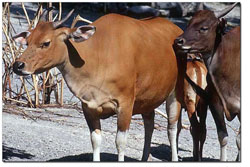| ||
The People's Republic of Mystery Meat
by Ari LeVaux The U.S. Olympic team has decided to take its own food to the summer games in Beijing. The decision, which China called “a pity,” was precipitated when a U.S. Olympic Committee (USOC) official encountered a 14-inch chicken breast in a Beijing supermarket. Tests on the super-sized slab revealed enough steroids to give the New York Yankees pitching squad man-boobs. Athletes testing positive for steroids, however, isn’t the only scenario the USOC hopes to avoid by packing its own lunch. There are safety concerns, too, based on recent news stories about tainted Chinese food – a batch of dumplings laced with the toxic insecticide methamidophos that hospitalized scores of people and put a 10-year-old girl in a coma, for example; or reports of Australian Olympic athletes falling ill in China. Atop ancient stereotypes about what goes on in Chinese kitchens, these incidents helped convince USOC officials that the food in China isn’t worth the risk. In a way, I agree with China. That’s a pity. Much of the food China plans to serve has been contracted from farms near Beijing, making this decision a snub to locally grown food. I mean, maybe if the USOC decided to supply America’s Olympians with free-range, organic chicken or some similar level of certifiably high-quality food, an honorable statement would have been made. Unfortunately, the USOC chose Tyson Foods to provide animal protein for the 600 athletes in America’s Olympic delegation, ordering 25,000 pounds of lean beef, chicken and pork from the largest meat company in the world. Tyson, which supplies meat to KFC, Taco Bell and most other major fast-food joints, is, for a number of reasons, a surprising choice as a replacement for scary Chinese food. Last year, an employee at a Tyson chicken processing plant shot a video and gave it to People for the Ethical Treatment of Animals. It shows workers urinating on the assembly line of dead and dying chickens, while other chickens are smashed around, hooked and cursed at while their heads are yanked off. This video supports claims of such activity in multiple Tyson plants. And apparently, Tyson workers don’t fare much better – the company has been implicated in multiple labor violations as well. Meatpacking is one of the most dangerous jobs in America. Against that backdrop, Tyson’s alleged actions include the dismissal of workers who develop work-related injuries, denial of workman’s compensation, union busting and smuggling illegal aliens to work for substandard wages. Meanwhile, Tyson regularly earns headlines for pollution problems; the company pled guilty, for example, to 20 felony violations of the federal Clean Water Act at a Missouri poultry plant, where it dumped untreated wastewater into a stream. All told, I think it’s a stretch to assume that Tyson meat is any more wholesome, safe and karmically pure than what you’ll find in China. And the scary thing is, of course, that Tyson isn’t even the lowest-grade meat available in the United States. As we all probably know by now, that distinction belongs to the meat in American public school lunches. Another film, taken by a Humane Society operative at the Hallmark/Westland meatpacking plant in Chino, Calif., and released recently, shows cattle that are too sick and weak to stand up being prodded, shocked and jabbed toward slaughter. While the abuse was obvious, the food-safety concerns related to the killing of the so-called downer cattle were what compelled the USDA to recall 143 million pounds of meat from the plant – the largest beef recall in history. Westland/Hallmark supplies 20 percent of the nation’s school lunchmeat, making it the second-largest supplier of meat to American schools. The marketing of such meat to schools is facilitated by the National School Lunch Program (NSLP), which purchases USDA surplus agricultural products, gives public schools yearly purchasing credits and then sells them the food dirt-cheap. Turns out, public school kitchens were getting what they’d paid for. Surplus, another name for leftovers, is what plants like Westland/Hallmark evidently specialize in. The only arrests in the Westland/Hallmark affair have been two Hispanic workers charged with animal cruelty. How fair is that? They might as well have arrested the cows for being sick and weak. Perhaps if it were our Olympic dreams, and not our children, that were on the line, different heads would be rolling. Or maybe if it went down in China. Speaking of which, a Freudian typo in South Africa’s Independent Online says it all: “Hallmark/Westland Meat Packing of China, California.” Chinese officials would have every right to take offense at the slip, just as they would have every right to deny entry to any suspect chicken patties shipped to Beijing this summer – by a corporation that’s a convicted felon. •
|
In this week's issue...
- December 18, 2025
- Let it snow
Although ski areas across the West have taken a hit, there’s still hope
- December 18, 2025
- Look, but don't take
Lessons in pottery theft – and remorse – from SW Colorado
- December 11, 2025
- Big plans
Whole Foods, 270 apartments could be coming to Durango Mall parcel


